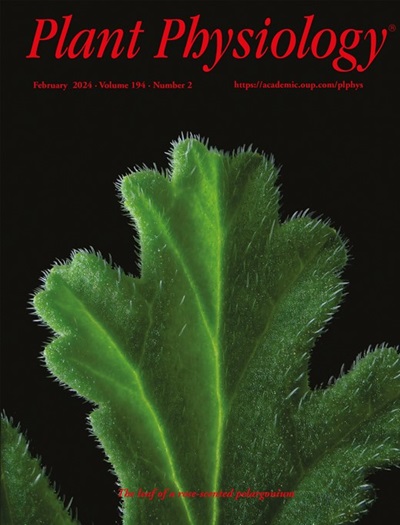The MdVQ17/MdVQ37-MdWRKY100 module coordinates apple salt tolerance by modulating Na+/K+ homeostasis and ROS scavenging.
IF 6.9
1区 生物学
Q1 PLANT SCIENCES
引用次数: 0
Abstract
Salt stress greatly affects the yield and quality of agricultural crops, limiting their geographic distribution. Valine-glutamine (VQ) motif-containing proteins function as transcriptional regulators of plant growth and stress responses. However, the role and underlying molecular mechanisms of VQ proteins in apple (Malus domestica) salt stress responses remain largely unknown. Here, MdVQ17 was identified as a salt-responsive gene that negatively regulates salt tolerance in apple plants by increasing the Na+/K+ ratio and suppressing reactive oxygen species (ROS) scavenging under salt stress. MdWRKY100, a WRKY transcription factor that enhances apple salt tolerance, was identified as an MdVQ17-interacting protein. MdWRKY100 directly bound to the Arabidopsis K⁺ TRANSPORTER 1-LIKe (MdAKT1-like) and PEROXIDASE 57 (MdPER57) promoters, activating their transcription. MdVQ17 inhibited the binding and transcriptional activation activity of MdWRKY100 at these promoters, thereby suppressing MdWRKY100-mediated regulation of Na+/K+ homeostasis and antioxidant enzyme activity. MdVQ37, another MdWRKY100-interacting VQ protein, modulated the MdWRKY100-mediated salt response through a similar mechanism. Overall, these findings reveal that the MdVQ17/MdVQ37-MdWRKY100 module co-regulates Na+/K+ homeostasis and ROS scavenging by modulating MdAKT1-like and MdPER57 expression, providing insights into how the VQ-WRKY complex influences salt tolerance in apple.MdVQ17/MdVQ37-MdWRKY100模块通过调节Na+/K+稳态和ROS清除来协调苹果的耐盐性。
盐胁迫极大地影响了农作物的产量和品质,限制了它们的地理分布。缬氨酸-谷氨酰胺(VQ)基序蛋白在植物生长和胁迫反应中起转录调控作用。然而,VQ蛋白在苹果(Malus domestica)盐胁迫反应中的作用和潜在的分子机制在很大程度上仍然未知。本研究发现,MdVQ17是一个盐响应基因,在盐胁迫下通过增加Na+/K+比例和抑制活性氧(ROS)清除来负调控苹果耐盐性。MdWRKY100是一种提高苹果耐盐性的WRKY转录因子,被鉴定为与mdvq17相互作用的蛋白。MdWRKY100直接结合到拟南芥K + TRANSPORTER 1-LIKe (MdAKT1-like)和过氧化物酶57 (MdPER57)启动子上,激活它们的转录。MdVQ17抑制MdWRKY100在这些启动子上的结合和转录激活活性,从而抑制MdWRKY100介导的Na+/K+稳态和抗氧化酶活性的调节。MdVQ37,另一个与mdwrky100相互作用的VQ蛋白,通过类似的机制调节mdwrky100介导的盐反应。总之,这些发现表明,MdVQ17/MdVQ37-MdWRKY100模块通过调节MdAKT1-like和MdPER57的表达,共同调节Na+/K+稳态和ROS清除,为VQ-WRKY复合物如何影响苹果的耐盐性提供了新的见解。
本文章由计算机程序翻译,如有差异,请以英文原文为准。
求助全文
约1分钟内获得全文
求助全文
来源期刊

Plant Physiology
生物-植物科学
CiteScore
12.20
自引率
5.40%
发文量
535
审稿时长
2.3 months
期刊介绍:
Plant Physiology® is a distinguished and highly respected journal with a rich history dating back to its establishment in 1926. It stands as a leading international publication in the field of plant biology, covering a comprehensive range of topics from the molecular and structural aspects of plant life to systems biology and ecophysiology. Recognized as the most highly cited journal in plant sciences, Plant Physiology® is a testament to its commitment to excellence and the dissemination of groundbreaking research.
As the official publication of the American Society of Plant Biologists, Plant Physiology® upholds rigorous peer-review standards, ensuring that the scientific community receives the highest quality research. The journal releases 12 issues annually, providing a steady stream of new findings and insights to its readership.
 求助内容:
求助内容: 应助结果提醒方式:
应助结果提醒方式:


